Living and learning: Physical Activity
Our latest Living and Learning sessions have been all about the importance of exercise and how we need to keep active to keep our bodies and our minds healthy.
We thought about all the things we had done since waking up. Then, we checked which ones were active.
Trampolining in the garden
Wake up Shake up
Scooting to school
Playing with friends at playtime
Star jumps brain break
Monkey bars
The NHS guidance states that children and young people should ‘aim for an average of at least 60 minutes (30 minutes in school and 30 minutes out of school) of moderate or vigorous intensity physical activity a day across the week’. We know that the exercise we need to do to achieve this, should increase our heart rate.
We thought about how we manage to achieve our 30 minutes during the school day.
- Daily WUSU
- 2 weekly PE sessions
- Playtimes
- Lunchtime play
- Go Noodle, Supermovers and active counting in class
- Jogging around the playground for brain breaks
- After school clubs
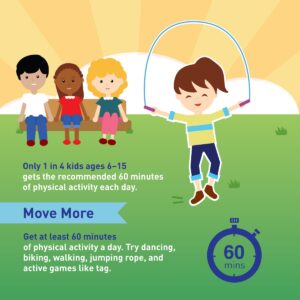
Help at home – try a new physical activity out of school – maybe a local Junior park run, local cricket lessons or tennis lessons.
Living and Learning:physical activity
Our latest Living and Learning sessions have been all about the importance of exercise and how we need to keep active to keep our bodies and our minds healthy.
We thought about all the things we had done since waking up. Then, we checked which ones were active.
Practised gymnastics
Wake up Shake up
Walking to school
Playing tig with friends at playtime
Classroom skipping brain break
Pull ups
The NHS guidance states that children and young people should ‘aim for an average of at least 60 minutes (30 minutes in school and 30 minutes out of school) of moderate or vigorous intensity physical activity a day across the week’. We know that the exercise we need to do to achieve this, should increase our heart rate.
We thought about how we manage to achieve our 30 minutes during the school day.
- Daily WUSU
- 2 weekly PE sessions
- Playtimes
- Lunchtime play
- Go Noodle, Supermovers and active counting in class
- Jogging around the playground for brain breaks
- After school clubs

Help at home – try a new physical activity out of school – maybe a local Junior park run, local cricket lessons or tennis lessons. Practice some skipping ready for our skipping festival.
Living and Learning: Physical Health
We have been talking in Living and Learning lessons about how physical activity can help our physical health as well as our mental health. Firstly, we defined physical wellbeing/health as ‘looking after and feeling good in your body’ and mental wellbeing/health as ‘looking after and feeling good in your mind’.
We then discussed how partaking in physical activity releases chemicals into our brains to make us feel good. We also learnt that when we exercise we have more energy which then means we can concentrate more.
Help at home: Try out a new sport or type of physical activity over the half term.
We are physicists!
Today, Year 3 continued their learning about magnets.
We learnt that magnets are a non-contact force. We also learnt that magnets having a north pole and a south pole .
We then conducted an experiment to see which poles attract (pull together) and which repel (push apart).

Help at home by asking your child if they can remember which poles attract and which repel!
Living and Learning: Healthy Eating
In Living and Learning, we discussed the importance of a balanced diet and the advice of ‘five-a-day’. We enjoyed this learning outside during a circle time!
Circle times are a great time in the week to have honest, open and mature discussions in a different seating arrangement!
In our circle time, we talked not only about a balanced diet and ‘five-a-day’ but about the different food groups and the benefits they provide our bodies!
Did you know:
- You should only have 150ml of fruit juice a day?
- If you drink a fruit smoothie, it only counts as one portion no matter how many different fruits are in there?
- Dried fruit should be eaten as a dessert rather than a snack to prevent tooth decay?
- It is healthier to buy tinned fruit in juices rather than syrup?
Help at home: Visit the NHS website which gives more information about portion sizes and healthy choices. Then, with this knowledge, why not try to plan, prepare and enjoy a healthy meal which contributes towards your five-a-day.
We are biologists
This half-term, we’re biologists, learning specifically about plants.
Here’s a list of key words that we’ve been learning as part of our topic.
seed: the part of a plant which can grow into a new plant
bulbs: the round underground part of a plant that contains food for the plant (eg onion bulb, daffodil bulb, tulip bulb)
basic needs: the things that a plant needs to live
temperature: a measurement of how hot or cold something is
growth: an increase in size
healthy: feeling well and happy
germinate: when a seed begins to grow into a plant
seedling: a young plant grown from a seed
Throughout this learning, we have been carrying two investigations.
How do bulbs grow? What do plants need to help them grow?
We put some onion bulbs in different conditions and observed the changes over time.
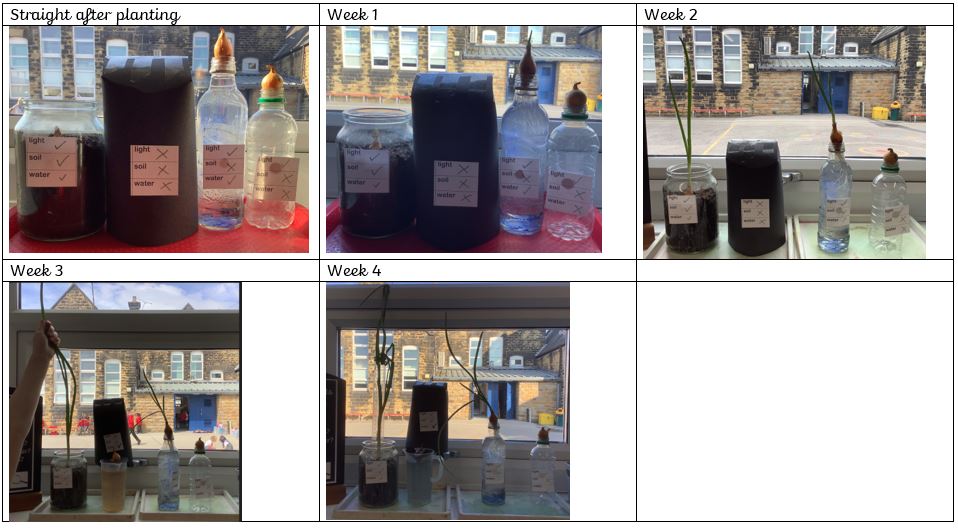
Ask your child to explain what had happened.
What do seeds need to germinate?
After observing and comparing different seeds, we planted seeds in different locations (and therefore different conditions). All the plants were given water.

Week 1

After one week, this is what had happened. The seeds had germinated in two out of the three locations. Even though the seedlings had started to grow in the cupboard and the classroom, they looked different and we observed these differences.

After two weeks, we were surprised to see that the seeds in the fridge had started to germinate. There were only small seedlings and they looked pale and not very healthy. The seedlings in the classroom on the window sill were definitely looking the healthiest with lots of dark green leaves.
We’ve also noticed a change in the tree in the front playground. How has it changed?

Help at home this week, the children have taken home their own planted sunflower seed to look after. Read the instructions to help the plant to grow as best as it can. We’d love to see how the plants are getting on!
Women’s role after WW2
After the end of WW2, women who had been working in munitions factories and doing agricultural work for the Women’s Land Army had to return to more traditional roles as men returned from war.
Having their horizons narrowed, women who worked during the war told stories to their daughters about the experiences of work they’d had during WW2.
As a result, the 60s and 70s saw the emergence of feminist groups who protested against the inequality between women and men.
In our history learning, we made freeze frames to illustrate how women felt after the end of WW2. Feelings of anger, solidarity and a longing to return to the jobs they had experienced during the war were prominent.



Help at home by asking your child if they can remember what the end of WW2 meant for women. This website is useful to recap our learning, too: https://www.bbc.co.uk/teach/did-ww2-change-life-for-women/zbktwty
Well done, Y6!
Basketball
City of Leeds Basketball, who provide our after-school basketball clubs, have a range of sessions for children of all ages.
Visit their website to book.

Summer 1: Week 5
On Tuesday, we made fruit kebabs. We practised our fine motor skills by cutting the fruit and threading the pieces onto the kebab sticks. Some of the children made their fruit kebab into a repeating pattern.
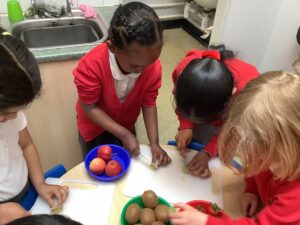

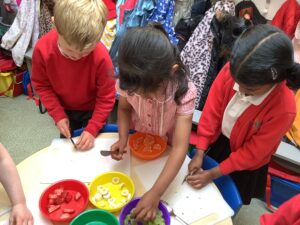



 After making our fruit kebabs, we enjoyed eating them in the sunshine with our friends.
After making our fruit kebabs, we enjoyed eating them in the sunshine with our friends.

 Literacy
Literacy
We’ve been reading Farmyard Hullabaloo by Gile Andreae.
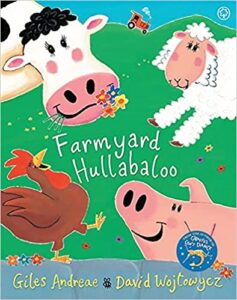 When reading, the children enjoyed listening carefully and working out the missing rhyming words. After this, we had a go at making our own rhyming strings. For example, munch, crunch, bunch, lunch
When reading, the children enjoyed listening carefully and working out the missing rhyming words. After this, we had a go at making our own rhyming strings. For example, munch, crunch, bunch, lunch
Help at home: Can you think of your own rhyming string?
PE
Yesterday afternoon, we enjoyed another Foot—Tech session. We used beanbags and different sized balls to practise our throwing skills. We explored lots of different types of throws: underarm, overarm, two-handed, one-handed, backwards, through our legs.
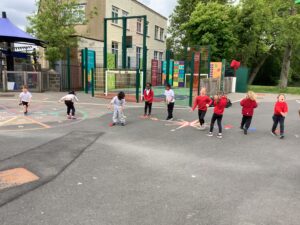
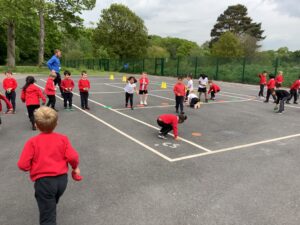
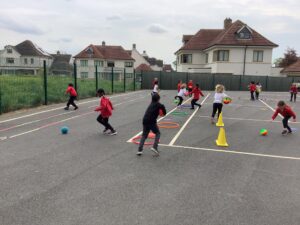
Poetry Picnic
This week’s poem was called The Fox. When learning this poem, we shared lots of our own experiences about foxes.
Caterpillars
It’s exciting times in Reception… all of our caterpillars have now made a chrysalis (cocoon). Everyday, we’re observing and waiting patiently for the final stage of the cycle. I’m keeping my fingers crossed this happens before before we break up for half-term!
 Phonics
Phonics
This week, we’ve been learning to read and write words ending in:
- – ing
For example, squelching, twisting - – ed =/t/
For example, bumped, cracked - -ed = /id/
For example, grunted, trusted - -est
For example, plumpest, freshestWe also learnt the last two phase 4 tricky words.
Help at home: Practise reading and writing the phase 4 tricky words.~
 Reminders
Reminders
- As the weather gets warmer, it’s so important we keep hydrated. Please send your child to school with a water bottle and a named sun hat.
- Library books need to be returned every Friday.
It looks like the weekends going to be a warm one! I hope you all have a happy and healthy one whatever you get up to.
History – Heroes!
We are really enjoying our History topic this half term all about real life heroes! We have been studying Nelson Mandela and Leonora Cohen and how they changed the world by fighting for what they believed in.
We have learnt lots of facts about both people. Try asking your child about Nelson Mandela or Leonora Cohen so they can show off what they know! I have been very impressed at how well the children have understood the ideas we have been talking about.
In this week’s lesson, we learnt about how Leonora Cohen protested for women to have the right to vote. We learnt she went to the Tower of London and threw an iron bar at a glass cabinet containing the Crown Jewels. We discussed whether this was the right thing to do or not. After we had discussed this, we got into small groups and acted out the incident, thinking carefully about how Leonora would have been feeling before, during and after the event.

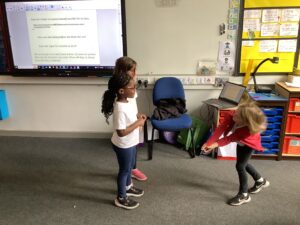

Help at home by talking to your children about what they have learnt, including the vocabulary which has been sent home on today’s homework sheet.